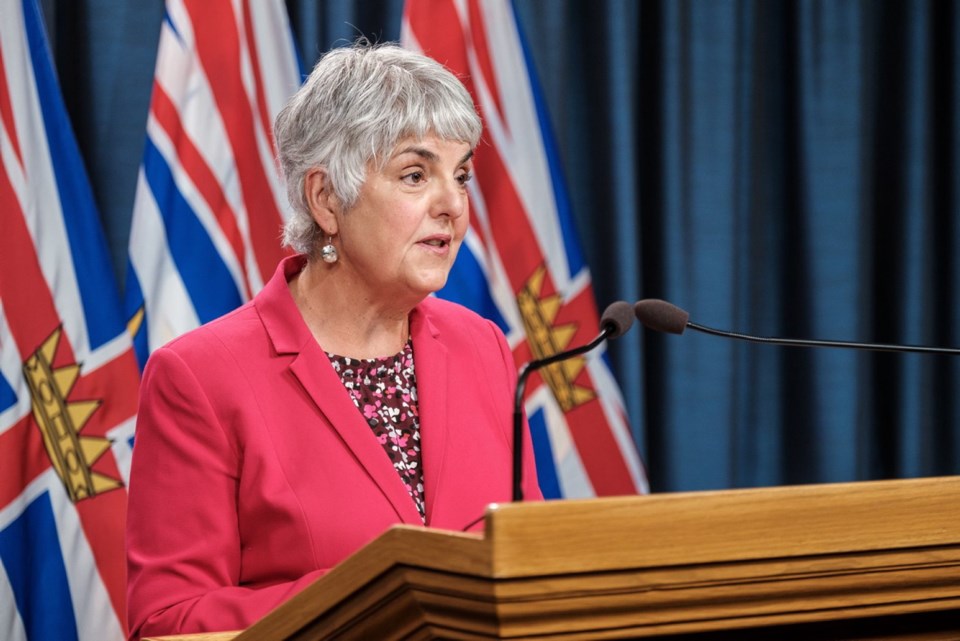Small businesses in British Columbia struggling to pay rent this month will be protected from eviction by an emergency government order that encourages landlords to take advantage of a federal relief program.
Finance Minister Carole James said Monday the order under the Emergency Program Act will protect small business owners from being evicted if they can’t pay rent due to the impacts of COVID-19 pandemic.
Landlords who choose not to apply for the federal government’s Canada Emergency Commercial Rent Assistance program, launched May 24, will not be able to evict their small business tenants for unpaid rent, she said.
“This order restricts lease terminations, rent repayment lawsuits and the repossession of small businesses’ goods and property,” James said at a news conference. “This emergency order will be in place while the federal program is in place.”
The B.C. eviction protection program could be extended if the federal relief program goes beyond June, she said. The federal program offers reductions of 75 per cent in monthly rent to small businesses by providing forgivable loans to landlords.
James said the federal and B.C. governments will cover 50 per cent of the rent payments, while the tenants are responsible for 25 per cent and landlords are expected to cover the remaining 25 per cent.
“It’s a federally designed and delivered program that offers forgivable loans to commercial landlords who have tenants who’ve lost significant income during the pandemic, at least 70 per cent,” she said. “There are landlords who have not applied for the relief and unless the landlord applies for the program, the program isn’t available to small business tenants.”
Local reaction to the program was mixed.
Catherine Holt, chief executive of the Greater Victoria Chamber of Commerce, wondered if it wasn’t a bit of a big stick for the province to use.
“I’m sure this will encourage a number of landlords to consider the program, particularly if they were on the fence about it,” she said. “But now the province is saying you cannot evict for three months — basically telling the tenant you can choose to pay rent or not until the end of June.”
On top of that, the program is not straightforward, she said, and some landlords are afraid they could be left on the hook down the road. Holt said many landlords realize that if CMHC comes after them for money, they are left going after tenants who may not be there anymore.
“There’s a reason they are having to march them to the door to apply,” she said.
Commercial real estate veteran Randy Holt, of Devencore Victoria, said most landlords would prefer to keep their tenants in place and many of them have been working with them over the last few months to keep them out of the red by deferring, forgiving or reducing rent.
He said the federal program is cumbersome and many landlords have been reluctant to get involved because of the added risk, the fact the deal may require a lender’s blessing and some are not able to handle such a large drop in rental income.
“Most landlords recognize they are better off working with tenants who they think are worthwhile in the long term to see them through this, and that’s being done on a tenant-by-tenant basis,” he said. “Most recognize they are better off not to be vacant.”
James said she does not have current data on how many landlords have applied for the program or how many are eligible but have not registered. She said she has heard reports of landlords working with their small business tenants who are trying to stay afloat.
The B.C. order is a measure to fill a gap in the federal program and aims to help small business endure hardships during the pandemic, James said.
She said small business will help drive B.C.’s economic recovery in the coming months and aiding their recovery benefits the province.
The emergency order should be viewed as an encouragement to landlords to allow small businesses to rebuild, the minister said.
“To make the move to encourage that support, I think, is certainly the right thing to do,” she said. “For landlords to have a reliable tenant, who is there in your business and who you have a relationship with, is a benefit to the landlord as well.”



